|
Given the sinister nature of a good many traditional fairy tales, it's actually surprising that modern horror cinema has not mined them more frequently. Part of the problem lies in the fact that the filmmaker most closely associated with fairy tale cinema is Walt Disney, not a great starting point for anyone looking to tell stories that will chill adult bones. And yet take a closer look at the folklore that many of these stories are drawn from and you'll find tales more suitable for adults than the children they're generally pitched at. An earlier version of Sleeping Beauty, for instance, saw the princess awakened by rape rather than a kiss, while Jacob and Wilhelm Grimm's version of Cinderella had the ugly step-sisters cutting off parts of their feet in order to wedge them into the glass slipper and having their eyes pecked out by pigeons. Now isn't that the version you'd like to see?
You don't have to dig beneath the surface to appreciate the adult element of Hansel and Gretel, another folk tale reshaped by the aptly named Brothers Grimm, one in which two young children are abandoned in the woods by their parents and then enticed with candy into an isolated house, where the intention is to fatten them up to be eaten. Of course, herein lies the problem for filmmakers, as putting young children in cinematic peril has always meant straying into potentially tricky territory, with possible audience alienation walking hand-in-hand with cultural paranoia over the very concept, especially when these same young children are generally perceived as being the target audience for such tales.
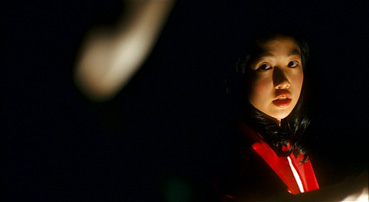
The film version of Hansel & Gretel under examination here, however, is Korean in origin, and although I have no wish to get into any sort of cultural stereotyping, Korean genre cinema has repeatedly demonstrated a willingness to go to thematically riskier places than its western counterparts. I have absolutely no doubt that this is one of the reasons the oft-rumoured American remake of Park Chan-wook's Oldboy has yet to appear and why its climax will likely be either heavily re-written or seriously diluted should it ever do so. That Hansel & Gretel director Yim Pil-sung has used the original story merely as a starting point for his own particular tale of kids in the woods offers little comfort, particularly with the introduction of a character who... no, I'm getting ahead of myself.
It all starts when company salesman Eun-soo is driving along a quiet but rain-soaked road and concentrating more on the phone call to his pregnant girlfriend than the way ahead, which results in him skidding and crashing the car (an arrestingly shot sequence) into the woodland below. After stumbling from the wreck and falling temporarily unconscious, he is discovered in the dark by a lantern-bearing young girl named Young-hee, who leads him back to the safety of her house deep within the dense forest.
Right from this moment there's a sense of strange other-worldliness that perfectly captures the sense of a dark fairy tale. Maybe it's Young-hee's bright red cape and unruffled white dress, or the eerie light from her lantern in the surrounding blackness, or her soft-spoken conversation with the confused Eun-soo, but we're left in no doubt that something's not quite right here. It's a sensation enhanced when they reach the house, a picture-book perfect rustic retreat illuminated by warm lamplight and bearing the name "The House of Happy Children." Despite the late hour, Young-hee's entire family are there to greet their new visitor and welcome him into their home.
If you thought the forest walk was creepy, just wait until you get inside. We're not talking Tim Burton style dark grotesque here, but a degree of childlike sweetness that goes several notches beyond the norm into the area of troubling peculiarity. The house is colourfully decorated and littered with toys, there are images of woodland and rabbits everywhere (including a particularly odd portrait of humans with rabbit heads), and everyone is wearing slippers of fluffy animal design, including Eun-soo, who is studied by the curious family from their brightly coloured sofa. The smiling mother introduces him to eldest son Man-bok, the seven-year-old Jung-soon, and daughter Young-hee, whom he's already met. It's a picture of nuclear family perfection, and yet you absolutely know from the way that this scene unfolds that Eun-soo should get his head together quickly and run like his life depended on it. But he's still dazed from the accident and is having trouble even staying awake. He does ask to use their phone, but as the father apologetically explains, it was disconnected a few days ago and no-one's arrived to fix it.
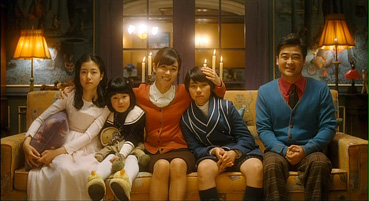
Any suspicions that Eun-soo will be going anywhere are quickly quashed the following morning, when he wakes in a bedroom littered with childhood paraphernalia. His mobile phone is out of service range and the caption 'Day One' appears on screen. Day one of what, exactly? The super-sweet creepiness of the previous evening continues when Eun-soo is served an elephant-sized breakfast of brightly coloured cakes and sweets by the ever-smiling parents, while the three children proceed to eat and drink in time with his every movement. He repeats his enquiry about the phone, spicing up the urgency by telling them that his mother is in a critical condition, prompting enquiries about the meaning of these words from the children and a momentary nervous twitch on the mother's part. When Eun-soo backs off a bit by suggesting that his family aren't actually that close, Man-bok stands up and coldly reminds him that "having a mother is the best thing in the world."
If you're not already on edge then you soon will be. The thing is, there's nothing overtly sinister in anything that's said or shown, but everything about this surface-perfect family and their behaviour feels somehow wrong and even oddly threatening. Every now and then there are small signs that the carefully maintained surface is starting to crack, particularly visible in the parents: the leg that twitches uncontrollably as the father responds to Eun-soo's request for a phone; the small bead of sweat that runs down his face when he explains why he won't be going to work tomorrow; the mother's edgy neck-scratch as she fields a question about household supplies; the out-of-focus hand that hovers nervously over Man-bok's shoulder, feigning a gesture of parental comfort that is never completed.
The characters and situation are effectively established in the first fifteen minutes of the close to two-hour running time, and all that theoretically remains is to work out just what the hell is going on and what chance the hapless Eun-soo has of escaping it. But it ain't quite that simple. Answers are gradual in coming and genre tradition results in some effective misdirection, while the low-key approach allows director Yim Pil-Sung to squeeze considerable mileage from the Eun-soo's growing confusion and apprehension. Eun-soo, meanwhile, is repeatedly unable to leave – what should be a simple task, given that none of the family have the physical strength to keep him from walking away, proves as difficult as it did for the guests in Buñuel's The Exterminating Angel.
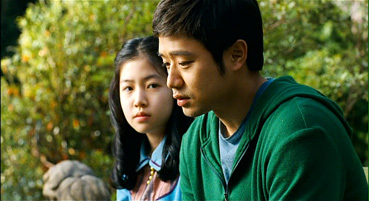
The following morning, after overhearing a heated late-night discussion between the parents, Eun-hoo rises to find they have both departed and put the kids in his charge for a few days, leaving him torn between his own desire to leave and his growing concern for the welfare of the traumatised children, a concern that is soon shown to be fully justified. As he makes his third failed effort to find a way out of the woods, a couple who've also lost their way after vehicular trouble are being led back to the house by Man-bok, and if you were previously worried about the games the kids might be playing on Eun-soo, then get ready to shift your concern when smiley Christian evangelist Deacon Byun and his female companion Kyung-sook get settled in. Creepy from the start, Kyung-sook turns out to be an avaricious bully, while Byun starts showing an interest in the children that goes way beyond his concern for their religious upbringing. It's here, and in the family's grim, flashback-revealed story, that the film gets into the sort of morally difficult areas that separate it from any western equivalent you're likely to come across, and mark this distinctly as a story for adults rather than children.
Like the early fairy stories from which their more sanitised modern equivalents were drawn, Hansel & Gretel has a decidedly dark core, one that places the threat to children of folklore tradition in a modern social context to explore its effects in a semi-supernatural manner, providing considerable thematic meat to an already unsettling narrative. In keeping with this approach, the threat is not confined to the dark, and is as menacing in brightly lit rooms and in the smiles of children as in the dense and disorientating woodland or the gloom of night. In some ways the film is almost the flipside of the deliciously gothic Pan's Labyrinth, to which it has been frequently and inaccurately compared, playing at times like a deconstruction of the Disney fairytale family by way of David Lynch and Park Chan-wook.
That it creates such a tangible skewed reality is due in no small part to Kim Ji-yong's gorgeous cinematography, Ryu Seong-hie's eye-popping production design, Lee Byung-woo's atmospheric score and director Yim Pil-Sung's way with discomforting camera angles and suggestive close-ups. Consistently good performances are all the more effective for their quiet restraint – the child actors in particular are most impressive, convincing both as cheerful innocents and a potential force for bad, and in the second half are put through enough to prompt a few questions about Korean child welfare laws.
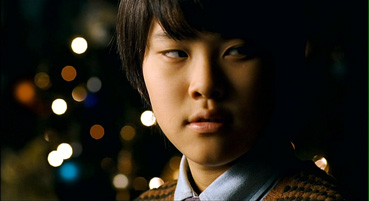
Aspects of the central conceit are adapted from a well known episode of The Twilight Zone (I'll not spoil things by revealing which one) and small borrowings are intermitently visible. Traditional horror and even J-horror elements are also in evidence, from the long-haired spook in the attic to the TV that will only show one channel and stays on even when unplugged, but all are seamlessly integrated into the satisfyingly complete whole. It may cheat on its internal logic to deliver its touching conclusion, but Hansel & Gretel is still a stylish, atmospheric, unsettling, involving and – dare I say it – refreshingly original fantasy work, and in these days of recycling and artistic cannibalism within the genre, that's something to get quietly excited about.
A generally impressive anamorphic 1.85:1 transfer, though it really does depend a little on your viewing equipment. Colours are appropriately bright without over-saturation, and the contrast is for the most part spot on, the deep blacks really isolating Eun-soo and Young-hee when they first meet in the forest at night. Occasionally some dark blue sneaks into the black areas, as in Eun-soo's dream of a dark figure on a swing, but this may have been deliberate. Sharpness is very good, but there are signs of some edge enhancement here that only really shows when there is a lot of detail on screen (patterned clothing, dense foliage), and is far more visible when upscaled to a large Plasma TV than on a smaller monitor or CRT screen. This could well be the result of a standards conversion – the running time here is the same as that of the cinema release – but if so there are no other telltale conversion issues to spoil the image.
The Dolby 5.1 surround and Dolby 2.0 stereo tracks are surprisingly similar, with little specific use made of the surrounds on the 5.1 track and most of the action taking place front and centre. Clarity and dynamic range are very good, though. The only real problem here is that the soundtrack appears to have been levelled out, so to speak, as if it had been transferred with the sound levels on automatic. Thus an almighty scream that should make you recoil is muted to the level of the sounds that precede and follow it, like the volume had been turned down for that moment by someone afraid of hurting their ears. For much of the film this is not an issue, but when things do get loud towards the end it's a little annoying.
55 minute making-of featurette (55:12)
A substantial if loosely structured collection of behind-the-scenes DV footage of the shoot, which includes the preparation and filming of a number of sequences, some between-take larking about, the odd out-take, and a segmented interview with director Kim. Although interesting, it would be a lot more so if more than the odd bit was subtitled, but whole sections – including comments made to camera, off-the-cuff interviews with the young actors and three interviews with Kim – are not translated, rendering them effectively mute for a non-Korean audience. A shame, as this really does take the edge off what would otherwise be an enjoyable extra.
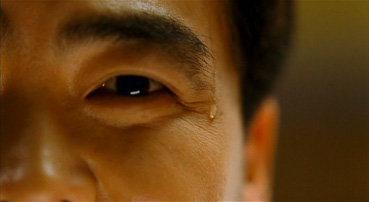
Interview with VFX director (9:39)
Visual effects director Jung Seong-jin humbly outlines his first impressions of the script, talks about working with the director and the material he contributed to the film, and expresses considerable satisfaction with the finished product. I was surprised to hear that there are 320 CG effects shots in the film, which would no doubt please Jung, as his favourite type of effect is one that is invisible to the audience.
Interview with production designer (14:26)
Production designer Ryu Seong-hie is similarly low-key about her considerable contribution to the film's overall feel, discussing the Korean attitude to fantasy and the task of creating the required look on a restricted budget. Apparently director Kim's key bit of guidance to her approach was to tell her that the house was made of cake.
The Hansel and Gretel Teaser Trailer (1:24) is a bit of a bugger in that it strips the story of its ambiguity and tells the audience how to read the situation from the outset. The same is true of the Hansel and Gretel Trailer (1:44), so do save these until after the movie.
Also included are trailers for other recent releases on this label, Fox Family, God Man Dog and The President's Last Bang.
A genuinely imaginative, atmospheric and very well made made fantasy thriller with enough dark elements to both remind us of the film's country of origin and to put Korean movie horror prominently back on the map. Terracotta's DVD is pretty good, but I still have reservations over the edge enhancement (or standards conversion) and the muting of louder sounds, and why oh why is the making-of documentary so lacking in English subtitles? All the same, for the film itself and the disc's other qualities, it still comes recommended.
|